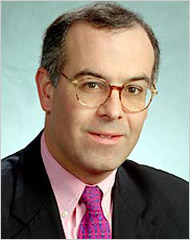The Neural Buddhists: Neurotheology in the NYT
 The New York Times published a last week on the topic of meta-neurotheology: the context and evolution of the social discussion about neurotheology. Author David Brooks points out the huge impact that the neuroscience revolution is having and will have on our culture’s views of God, religion, and science. His main point: the direction we will take as the discussion unfolds is not towards atheism and pure materialism, but rather something he calls neural Buddhism: “new movements that emphasize self-transcendence”, based on beliefs in a dynamic self , shared morals, elevated experience, and a new concept of God .
The New York Times published a last week on the topic of meta-neurotheology: the context and evolution of the social discussion about neurotheology. Author David Brooks points out the huge impact that the neuroscience revolution is having and will have on our culture’s views of God, religion, and science. His main point: the direction we will take as the discussion unfolds is not towards atheism and pure materialism, but rather something he calls neural Buddhism: “new movements that emphasize self-transcendence”, based on beliefs in a dynamic self , shared morals, elevated experience, and a new concept of God .
It’s great this issue is being raised, and not in the tired old “God vs. the atheists” cartoon fashion. This is one of the few times I’ve seen a mainstream media treatment of the issue actually distinguish between religion and spirituality. Unfortunately, Brooks confuses matters by trying to bring in God as an aspect of the spirituality side, which he redefines as “the unknowable total of all there is”. This means nothing. He goes on to say that the cognitive revolution is not going to end up undermining faith in God, it’s going to end up challenging faith in the Bible. No doubt about the latter, but any useful concept of God is not about faith, it’s about experience; and the God that Brooks apparently is referring to is so different from the God of the Bible as to be unrecognizable.
Brooks states that
over the past several years, the momentum has shifted away from hard-core materialism. The brain seems less like a cold machine. It does not operate like a computer. Instead, meaning, belief and consciousness seem to emerge mysteriously from idiosyncratic networks of neural firings. Those squishy things called emotions play a gigantic role in all forms of thinking. Love is vital to brain development. Researchers now spend a lot of time trying to understand universal moral intuitions. Genes are not merely selfish, it appears. Instead, people seem to have deep instincts for fairness, empathy and attachment.
I’d beg to differ. Although certainly the simplistic brain-as-computer models have been discredited, at its heart the brain remains a computing device , albeit one with a highly unique and massively parallel architecture. Leaving aside the odd conflation of “meaning” with “belief” and “consciousness”, it’s absurd to claim that there’s “momentum” towards thinking that any of those things emerges mysteriously–there is simply increased awareness of the holes in our understanding as we peer in more closely. Emotions may be squishy but are nevertheless controlled by increasingly well understood neurochemical processes. And how does the fact that researchers are trying to understand universal moral intuitions have anything to do with a shift away from “hard-core materialism”? They are trying to understand them within materialistic frameworks such as evolutionary psychology.
Particularly odd is Brooks’ treatment of Newberg’s research; he interprets the finding that transcendent experiences can actually be identified and measured in the brain as showing that “scientists have more respect for elevated spiritual states.” But what could be more materialistic than the attribution of transcendent experiences to brain processes?
Finally, it is odd that Brooks manages to completely ignore the work of the Atran’s and Boyer’s of the world. People’s belief in the white-bearded sort of God that created the earth in seven days will not melt away after they read one article on how the brain facilitates transcendent experiences or hear their brother-in-law talking about it. Changes in belief structures of this sort require time on a microevolutionary scale–generations.
Having said that, as a civilization we could do much worse than to move in the direction Brooks suggests we will, towards a broader concept of personal spiritual development bolstered by ever more insightful understanding of the biological processes underlying them.
